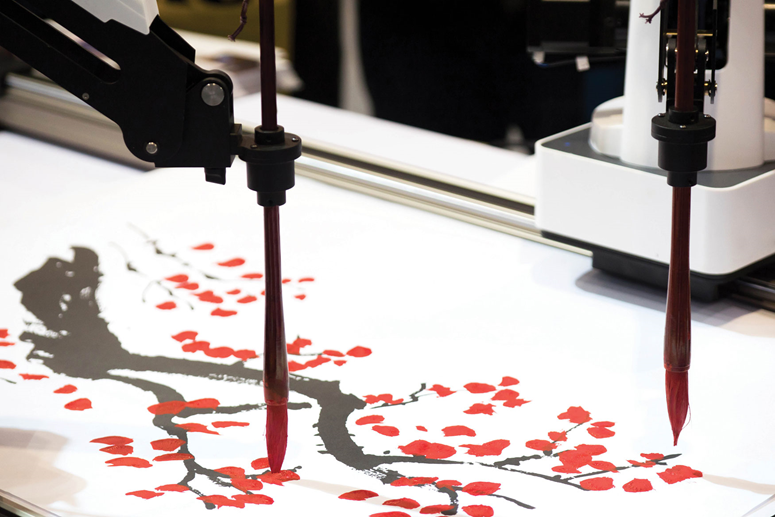?Do AI art enthusiasts understand the arts

Why do so many invest in promoting art produced by artificial intelligence when it seems clear that they do not show any real passion for this discipline in the first place? (Getty Images)
This development can provide a useful framework or springboard for real creative work, in the same way that scrolling through Twitter accounts can provide motives for expressing anger at the dangers posed by this type of art.
Have you ever wondered what lies beyond the boundaries of Leonardo da Vinci 's " Mona Lisa "? Or how the two sidewalks on the cover of the album Abbey Road [the four members of the band appear crossing a pedestrian path outside the Abbey Road studios, which became one of the most famous images in the history of popular music] ? And what about other parts of the city space that Van Gogh does not paint in his painting "The Starry Night"?
If you answered "yes" to any of the above questions, I have good news for you: in art, things don't work that way. There is no part that "completes" the oil painting "Nighthawks" by Edward Hopper, because it begins and ends with what Hopper sees fit to transfer to the canvas in the form of a drawing. There are no additional hidden geometric shapes waiting to be found outside the boundaries of the Dutch abstract artist Mondrian's work, because he basically did not paint those shapes that are not in the paintings. Even in a picture like the album cover of the lyrical "Abby Road", where activity was taking place outside the boundaries of the shot that we are not aware of, these details remain without meaning, because the artist did not capture them with his lens.
But try telling that to the AI tech geeks whose endless insults to the visual arts have reached new levels of chutzpah in the past few days, when several Twitter accounts have been posting AI drawings imagining what the landscape outlining famous works of art might look like [i.e., expanding their boundaries and drawing new contours beyond the original image as if to complement it, of course, with the help of human guidance].

It is known that many of the biggest proponents of art produced by artificial intelligence are illiterate in terms of the aesthetic value of art, but this time they have outdone themselves. If they happen to succeed in directing their creativity to anything other than finding creative ways to distort our common cultural heritage, they may find themselves inadvertently creating something useful as a way of change.
Saying that you have developed a way to "complete" parts that are not in the Mona Lisa is like adding more sides to the triangle and claiming that you have made it into a better geometric shape. In fact, this indicates a misunderstanding of what a triangle is in the first place.
It is the core issue in the current trend towards AI art: it is evidently supported by a group of people who know nothing about art and feel resentment towards those with technical knowledge. If your understanding of art says "paint more, do better", then you shouldn't be part of the discussion in the first place, but it seems to be predominantly in this category at the moment.

Of course, it is not wrong to create a beautiful picture and hang it on the wall because its shapes and colors give you a beautiful feeling. But the problem lies in trying to reduce art to this feeling and nothing else.
The shape of a painting is only a small part of the many things that make art successful, and at the end of the day, the form remains the most that artificial intelligence, and its supporters, can really give us. A trivial, shallow approach to what art ends up with if one is too lazy to pick up a book and actually indulge in it.
For real art, AI is more like jingling keys in a child's face than entertaining them. It is a shadow on a wall, and we have been asked to give the illusion that this shadow is of the same quality as the object which originally made it.

but why? Why are so many people invested in promoting AI-generated art when they clearly don't show any real passion for the field in the first place? It is true that money seems to be a factor, but on the other hand, it is also no secret to anyone that the current real yearning to “put these creative types to limit” among those who feel resentful because they do not carry any iota of creativity within them.
The real danger posed by AI-generated art, or literature, indeed any creative work, is that a machine will do it just as well as a [creative] man or woman does. It goes without saying that there is a motive for profit in technology in all its aspects, but [artificial intelligence] is one of the rare examples where the goal is overtly counterproductive.
As a tool designed to be used by humans, AI certainly has a wide variety of uses. It can provide a convenient framework or springboard for real creative work, likewise browsing the Twitter platform provides motives to complain and attack the dangers of art made by artificial intelligence.
But if you think [artificial intelligence] enhances human creativity or replaces it altogether, or worse, if you're excited about the possibility, then your belief proves only one thing: you never understood art in the first place.
Source : websites

